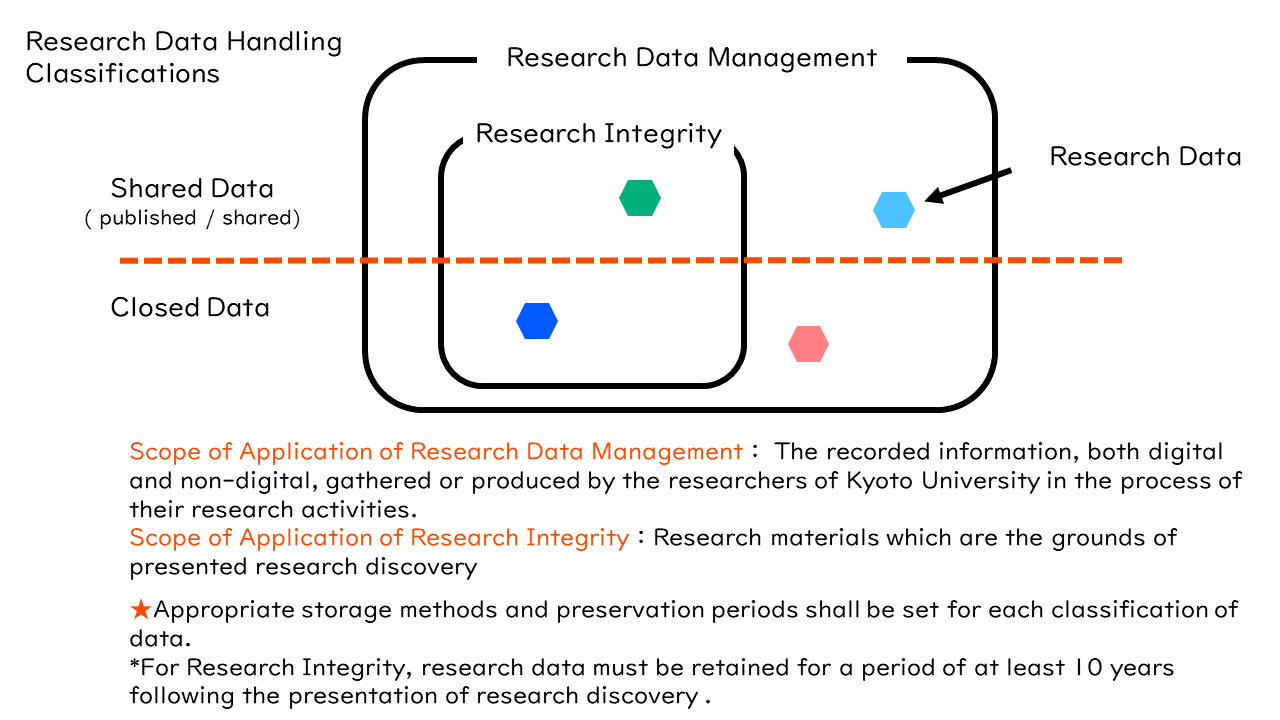Overview#
Why Implement Research Data Management (RDM)?#
There are several reasons why Research Data Management (RDM) is needed:
- The development of information and communication technology has led to the generation of large amounts of data, and its utilization over networks is advancing.
- A global trend towards open science and other initiatives to vitalize academic research by making research outputs open.
- The demand for data supporting academic papers and its long-term preservation.
By properly managing the research data, researchers can enhance the continuity, efficiency, and integrity of their research activities. When they publish and share research findings, building upon their routine data management practices, it’s expected to lead to further advancements in academic research.
Next, the concept of RDM will be elaborated upon.
What is Research Data?#
While the term “research data” is used in a variety of different contexts, here we are introducing the concept of classifying “research data” in the contexts of “Research Integrity” and “Research Data Management” in accordance with “Kyoto University Policy on Research Data Management and Sharing” and other Kyoto University regulations.
Within the context of Research Integrity, research data refers to the “research materials which are the grounds of presented research discovery. ”1 Conversely, within the context of Research Data Management, research data refers to the “the recorded information, both digital and non-digital, gathered or produced by the researchers of Kyoto University in the process of their research activities .”2 Under these classifications, the scope within which “research data” is handled differs between the contexts of Research Integrity and Research Data Management. Research data within the context of Research Integrity accounts for only a portion of all research data handled within the larger context of Research Data Management.
In neither context is it considered “necessary for all research data to be shared.” Furthermore, while it is necessary to properly manage research data, “proper management” does not entail that all research data must be preserved indefinitely.
It is important to distinguish between data to be shared and data to keep closed, to specify a preservation period for each, to ensure appropriate handling, and to clarify who is responsible.

- Matters ruled for the Preservation and Disclosure of Research Data as defined in Article 7- 2 of the Regulations regarding Promoting Research Integrity of Kyoto University (PDF)
- Kyoto University Policy on Research Data Management and Sharing
What is Research Data Management?#
The term Research Data Management refers to the “means and methods by which information used or generated by a research project is organized, structured, preserved, and managed.” More specifically, it refers to the clarification and implementation of the following:
- Formulation of a Data Management Plan (DMP)
- Routine handling of information during research
- Long-term post-research data handling
In recent years, an increasing number of research funding organizations have been requiring the submission of a DMP when applying for research funding. Beginning from FY2024, the Grants-in-Aid for Scientific Research (KAKENHI) Program will also require submission of a DMP when applying for grants. Below is a summary of information on Research Data Management.
Research Integrity#
Research data within the context of Research Integrity refers to “research materials (e.g., documents, numerical data, images) which are the grounds of presented research discovery,” and this classification accounts for a portion of all research data handled within the larger context of Research Data Management. According to University Regulations, this refers to research data “that must be retained using a proper storage method for a certain period of time (in principle, at least 10 years following the presentation of research discovery) and disclosed as necessary.” This is explained in an easy-to-understand manner in the brochure titled “Research Data Preservation for Responsible Research”. Appropriate Research Data Management can also be considered a necessary step in ensuring Research Integrity.
Below is a summary of the Research Integrity efforts established by Kyoto University.
Research integrity rules & reporting
On the linked page, please refer specifically to the following resources.
- Regulations on Promoting Research Integrity, etc. at Kyoto University
- Matters ruled for the Preservation and Disclosure of Research Data as defined in Article 7- 2 of the Regulations regarding Promoting Research Integrity of Kyoto University
- Research Integrity pamphlet

